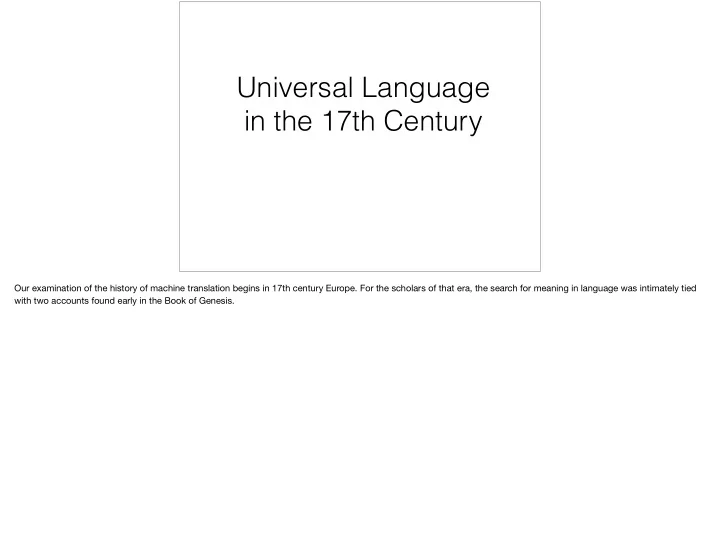

Universal Language in the 17th Century Our examination of the history of machine translation begins in 17th century Europe. For the scholars of that era, the search for meaning in language was intimately tied with two accounts found early in the Book of Genesis.
Adam names the animals Out of the ground the Lord God formed every beast of the field and every bird of the air, and brought them to Adam to see what he would call them. And whatever Adam called each living creature, that was its name. The scholars of 17th century Europe believed that the original human language, created by Adam in the Garden of Eden, perfectly linked the form of human language with the meaning of each thing and concept. In the words of the 17th century German mystic Jacob Boehme, Adam “knew the property of all creatures, and gave names to all creatures, from their essence, form and property. He understood the Language of Nature, the manifested and formed Word in everyone's essence, for thence the name of every creature is arisen.”
The Tower of Babel The prominent scholars of 17th century Europe believed that the many languages found in the world in their day no longer possessed the perfect qualities of the language of Adam. For them, that perfection was lost at the Tower of Babel. Now the whole earth had one language and one speech. And they said, “Come, let us build ourselves a city, and a tower whose top is in the heavens” But the Lord came down to see the city and the tower which the sons of men had built. And the Lord said, “Indeed the people are one and they all have one language, and this is what they begin to do; now nothing that they propose to do will be withheld from them. Come, let Us go down and there confuse their language, that they may not understand one another’s speech.” So the Lord scattered them abroad from there over the face of all the earth, and they ceased building the city. Therefore its name is called Babel, because there the Lord confused the language of all the earth; and from there the Lord scattered them abroad over the face of all the earth.
Francis Bacon • Advancement of Learning (1605) • De Augmentis Scientiarum (1623) Francis Bacon was a highly influential thinker of the early 17th century. In 1605, Bacon wrote about his understanding of the Chinese writing system. Bacon believed, mistakenly, that Chinese characters represented “neither letters nor words” but rather “things or notions.”
John Comenius • Via Lucis (1641) It was proposed that the restoration of a language where words and meaning were one could resolve the political and moral crises of the day. The Czech philosopher John Comenius exemplified this position, writing that “in this way alone can the commonwealth of men, now torn to pieces, be restored.”
Isaac Newton • Unpublished notes (1661) Many of the great thinkers of the 17th century would search for a universal character set that could be used by any language, and for a universal language that could recover the lost language spoken by the Biblical Adam. For a short time early in his career, Isaac Newton even began developing such a language.
Marin Mersenne In 1629, the French philosopher and mathematician Marin Mersenne wrote to René Descartes discussing one universal language which he had recently seen proposed.
René Descartes • Letter to Mersenne (1629) Descartes replied to Mersenne. Even though Descartes was critical of some details of the particular proposal, he was very much intrigued by the idea.
John Wilkins • An Essay towards a Real Character and a Philosophical Language (1668) One of the most well developed proposals was published by the English philosopher John Wilkins. The 600 page book lays out a detailed ontology on which to build a universal language.
Gottfried Leibniz • De Arte Combinatoria (1666) Another of the more well-known proposals was put forward by the German mathematician and philosopher Gottfried Leibniz.
Thomas Hobbes • Leviathan (1651) • De Corpora (1655) While many of the great thinkers of the 17th century believed in the idea of a universal language, not all thought that such a language was realistically attainable. Thomas Hobbes began his career working as a secretary for Francis Bacon, was a prominent English political philosopher. In his writings, Hobbes discusses meaning and ontologies, but warns against attempts “to prove that the kinds of things are not infinite.” He argues that no perfect categorization is possible so “long as philosophy remains imperfect.”
Jonathan Swift • Gulliver’s Travels (1726) The ideas behind universal language were parodied by Jonathon Swift in part of Gulliver’s Travels. Swift writes of a land where people have dispensed with words entirely, and instead carry around the actual objects they wish to refer to in conversation.
Voltaire • Candide (1759) The French philosopher Voltaire also parodied the ideas of Leibniz, including universal language, in his satire Candide and the character of Professor Pangloss.
Recommend
More recommend